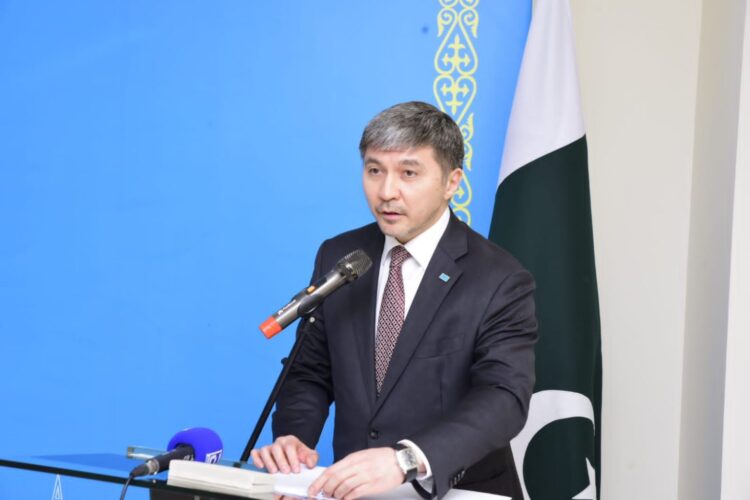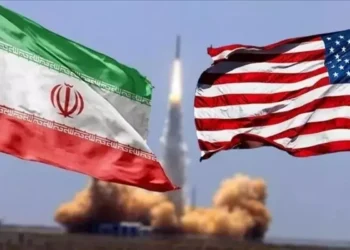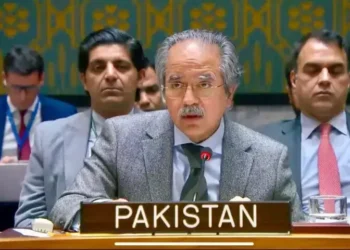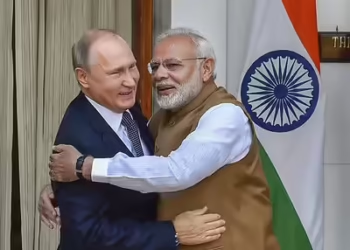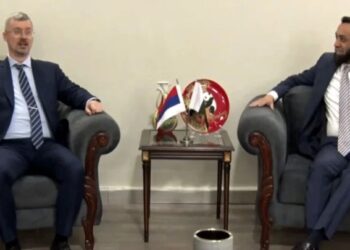ISLAMABAD; Kazakhstan’s Ambassador to Pakistan, Yerzhan Kistafin, has said that relations between Kazakhstan and Pakistan are entering a “transformative era” with growing cooperation in digital innovation, connectivity, trade, and interfaith dialogue.
Speaking at a press conference at the Embassy of Kazakhstan, Ambassador Kistafin underlined his country’s commitment to building long-term partnerships with Pakistan through concrete projects and high-level engagements.
The envoy recalled that President Kassym-Jomart Tokayev’s latest State of the Nation address placed unprecedented focus on digital transformation, highlighting Pakistan directly for the first time as a priority partner. This, he noted, demonstrates the importance Kazakhstan attaches to Islamabad in its reform and modernization drive.
He pointed out that in September, Islamabad hosted the inaugural in-person meeting of the Kazakhstan-Pakistan Joint Working Group on IT and Digital Communications. Delegates from Kazakhstan’s Ministry of Artificial Intelligence and Digital Development, along with private firms, held extensive talks with Pakistani counterparts, setting the stage for collaboration in AI integration, digital education, and technology transfer.
On regional connectivity, Ambassador Kistafin described proposed railway projects as “game changers” for Central and South Asia. He noted that the planned Turgundi–Herat railway would link Kazakhstan to Pakistani ports in Gwadar and Karachi through Turkmenistan and Afghanistan. Similarly, the Uzbekistan–Afghanistan–Pakistan rail corridor, he said, would create new trade routes and unlock vast commercial potential for the region.
The ambassador also highlighted Kazakhstan’s hosting of the 8th Congress of Leaders of World and Traditional Religions earlier this month in Astana, attended by 100 delegations. He appreciated Pakistan’s active role, saying interfaith dialogue remains crucial amid rising global tensions. Messages from global religious leaders at the event, he added, emphasized the need for spirituality in building peace.
Turning to economic ties, Kistafin called the past year “historic.” In April, Karachi hosted the largest-ever Kazakhstan-Pakistan Business Forum, attracting 500 participants, including 150 Kazakh delegates. Commercial contracts worth $200 million were signed, followed by the 30th Intergovernmental Joint Commission session, which produced agreements in trade, sports, culture, and investment.
He further disclosed that Kazakhstan’s sovereign wealth fund Samruk-Kazyna is exploring partnerships with Pakistan’s Fauji Foundation, signaling deeper corporate collaboration.
Importantly, the ambassador announced that Kazakhstan’s President will pay a state visit to Pakistan in early November — the first such visit in over two decades. He expressed confidence that the upcoming trip would “take bilateral cooperation to a new height.”
Ambassador Kistafin concluded by stressing that with progress in IT, connectivity, trade, and shared values, Kazakhstan and Pakistan are poised to emerge as pivotal partners in bridging Central and South Asia.




















































